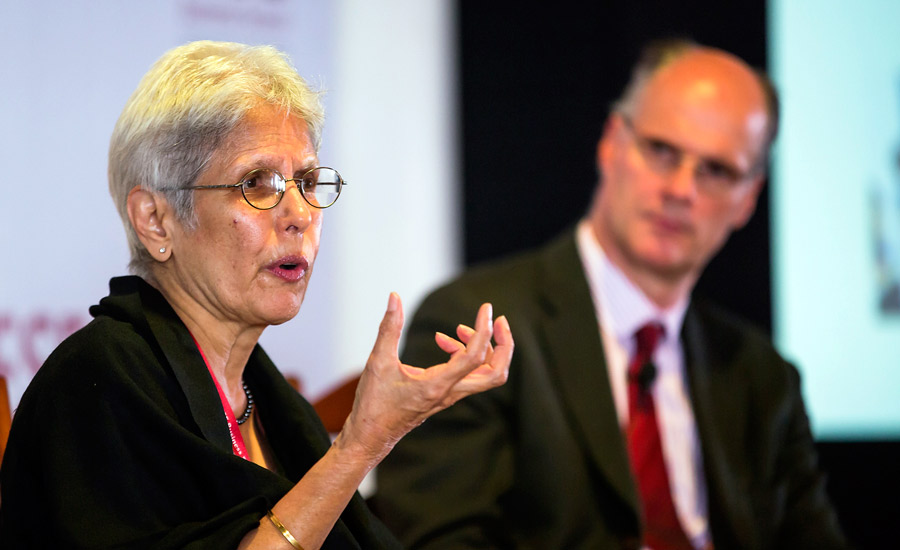
The lessons of life are, according to Anu Aga, inextricably tied to the lessons of loss.
Addressing the MBA 50th Anniversary in New Delhi this month, the former chairperson of Indian engineering giant Thermax observed: “From a young age it’s helpful to internalize that loss, separation and failure are built into our lives.
“At some stage we will have to face them. Every so-called misfortune, every rejection or loss teaches us profound lessons, if we allow life to be our greatest teacher.”
To put her ideas into context, Aga, explained the story of her own life, beginning with her childhood in Mumbai, when she was told to think only of getting married and having children, despite having higher grades at school than her two elder brothers who were encouraged to join the family business.
Her husband, Rohinton Aga, joined the family company instead, and took over as chairperson when Anu’s father retired. Anu studied a post-grad in social work then joined the company and worked her way up over five years to become head of Human Resources in 1990.
Facing Down the Challenges
It was then that she faced the first of what she described as “three great challenges” when Rohinton suffered a massive heart attack, followed by a stroke that “wiped away all his knowledge and intelligence.”
“He suffered brain damage,” said Aga, “but through determination he learned to write again, starting with ABC and 123. Within two years he led delegations from a business association, he authored a book. The lesson was: never take an expert’s opinion as final, but have faith in yourself. I also learned that nothing is permanent, and that you have to take care of your health.”
As head of HR, Aga said that she knew little of “hard-core business” but had already resolved to learn when her husband suffered a second massive stroke and died, in 1996. Two days later, the Thermax board named her as Executive Chairperson.
It was a “difficult time” – the company share price dropped to 35 rupees from a high of 400 rupees due, in part, to a national economic downturn. Shareholders were furious and Aga suffered self-doubt, believing that she had been appointed only because she owned 62 percent of the company’s shares.
“I had to face the second great challenge of my life: to wallow in self pity or to take charge of my life,” said Aga.
Building Confidence to Make Decisions
Against “great resistance” from other board members, Aga brought in an outside consulting firm, reconstituted the board and cut out many non-core businesses, which, she said, added to the top line but eroded the bottom line.
“In the ones we stayed in, we brought in a performance culture, rekindled innovation and customer focus.”
In 2002, Thermex turned around. In 2004, she retired as executive chairperson, a role that was taken up by her daughter Meher.
So why leave while the going was good?
“I’d always advocated smooth succession planning when I was in HR. Now I had to walk my talk.” Aga also said that she wanted to leave while she still had the energy to get back into social work.
Changing Tack
Aga is now active through the Thermax Social Initiative Foundation and she is involved with Akanksha, an NGO that promotes education for underprivileged children in Mumbai and Pune. She was recently nominated as a member of the Indian parliament.
Her decision to return to social work was in some ways motivated by what she described as her greatest challenge: just 18 months after the death of her husband, her son Kurush was killed in a traffic accident.
“The pain I’d felt when my husband died receded into insignificance compared with how I felt when my son passed away,” she said. “But by then I’d learned that pain is inevitable after such an event. But suffering, which lasts forever, is optional.”
Aga took inspiration from her son’s example to pursue new changes and challenges in her own life.
“My son was very concerned about poverty in India. He tried to get us to give a large percentage of our personal earnings to charity. I resisted at first but now we give 30 percent.”
Doing Business With Purpose
“A business cannot survive without growth,” says Aga, “but if growth is its only purpose then it should die, for it no longer has a reason to exist.”
“A business cannot succeed in a society that fails,” she said. “It cannot sustain itself. Growth without purpose is like cancer – it does not help the body. Aim high, challenge yourself, invest in yourself and live a life rich in experiences and deeper meaning.”